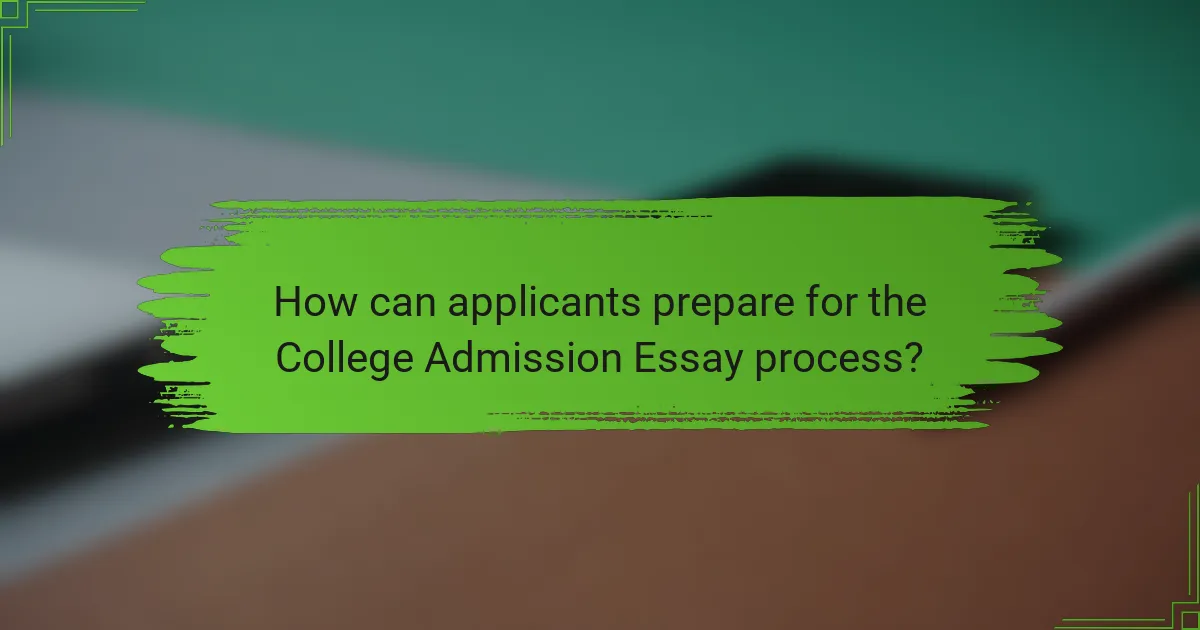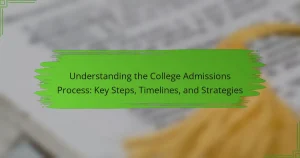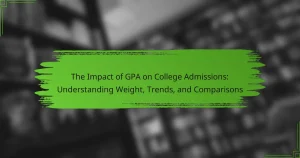
What are College Admission Essays?
College admission essays are personal statements submitted by applicants to colleges or universities. These essays allow students to showcase their personality, experiences, and goals. Admission committees use them to assess an applicant’s writing skills and character. A well-crafted essay can significantly impact an applicant’s chances of acceptance. Typically, colleges provide specific prompts or questions to guide the essay’s content. The essays often reflect the applicant’s unique perspective and motivations. They are a crucial part of the overall application process.
Why are College Admission Essays important for applicants?
College admission essays are important for applicants because they provide a unique opportunity to showcase individuality. These essays allow applicants to express their personality, experiences, and aspirations beyond academic metrics. They play a critical role in differentiating candidates in a competitive admissions landscape. According to the National Association for College Admission Counseling, essays can significantly influence admission decisions, particularly when applicants have similar grades and test scores. This means that a compelling essay can enhance an applicant’s chances of acceptance. Furthermore, colleges often seek to understand an applicant’s motivations and fit for their institution, which essays help convey effectively.
What role do they play in the admissions process?
College admission essays play a crucial role in the admissions process. They provide insight into an applicant’s personality, values, and writing abilities. Admission committees use essays to assess how well candidates can articulate their thoughts. Essays also allow students to showcase their unique experiences and perspectives. This helps differentiate them from other applicants with similar academic qualifications. A well-crafted essay can significantly enhance an applicant’s chances of acceptance. According to a survey by the National Association for College Admission Counseling, 24% of colleges consider essays as a very important factor in admissions decisions.
How do they differentiate applicants from one another?
Colleges differentiate applicants through several key factors. Academic performance is the primary metric, including GPA and standardized test scores. Extracurricular activities showcase a student’s interests and commitment. Personal essays provide insight into an applicant’s personality and values. Letters of recommendation offer perspectives on the applicant’s character and abilities. Additionally, unique experiences, such as overcoming challenges, can set applicants apart. Each of these elements contributes to a holistic review process that helps institutions identify the best fit for their programs.
What are the common types of prompts for College Admission Essays?
Common types of prompts for college admission essays include personal statements, reflective essays, and creative prompts. Personal statements typically ask applicants to share their experiences and motivations. Reflective essays often focus on personal growth and challenges overcome. Creative prompts encourage imaginative responses, allowing applicants to showcase their individuality. Many colleges also ask about future goals and aspirations. Other prompts may request descriptions of significant events or influences. Each type serves to reveal the applicant’s personality and fit for the institution.
What are the most frequently used prompts by colleges?
The most frequently used prompts by colleges include personal statements, experiences overcoming challenges, and reflections on identity. Many colleges ask applicants to describe a significant experience that shaped their perspective. Others prompt students to discuss their academic interests and future goals. Some colleges request essays on community service or leadership roles. A common prompt involves discussing a failure and what was learned from it. Additionally, many institutions ask students to explain why they are interested in attending that specific college. These prompts aim to gauge the applicant’s character, values, and motivations.
How do different types of prompts affect the essay writing approach?
Different types of prompts significantly influence the essay writing approach. Prompts can be open-ended or specific. Open-ended prompts encourage creativity and personal reflection. They allow writers to explore various themes and experiences. Specific prompts guide writers towards a focused topic. This can lead to a more structured essay. For instance, a prompt asking for a personal challenge may lead to a narrative format. In contrast, a prompt that requests a discussion on community involvement may require analytical skills. Research by the National Association for College Admission Counseling indicates that clarity in prompts leads to better-quality essays. Ultimately, the type of prompt shapes the direction, tone, and structure of the essay.
What are the key components of a successful College Admission Essay?
A successful college admission essay includes several key components. First, a compelling personal narrative is essential. This narrative should reflect the applicant’s unique experiences and perspectives. Second, clarity and coherence in writing are crucial. The essay must be well-organized and easy to follow. Third, authentic voice and tone are important. The applicant’s personality should shine through the writing. Fourth, specific examples and anecdotes enhance the essay’s impact. These details make the narrative relatable and memorable. Fifth, a strong introduction and conclusion frame the essay effectively. These sections should grab attention and leave a lasting impression. Lastly, attention to grammar and style is vital. Errors can distract from the content and undermine the applicant’s credibility.
How should applicants structure their essays?
Applicants should structure their essays with a clear introduction, body, and conclusion. The introduction should present a compelling hook and outline the main theme. Each body paragraph must focus on a single idea that supports the thesis. Applicants should use specific examples to illustrate their points. The conclusion should summarize the main insights and reinforce the essay’s significance. This structure helps maintain clarity and coherence. A well-structured essay enhances readability and engages the reader effectively.
What elements should be included to make an essay stand out?
A standout essay includes a strong thesis statement, engaging introduction, and clear structure. The thesis statement presents the main argument or point of the essay. An engaging introduction captures the reader’s attention and sets the tone. Clear structure organizes ideas logically, making it easy to follow. Unique personal anecdotes add authenticity and relatability. Vivid descriptions enhance imagery and emotional connection. Strong vocabulary and varied sentence structure improve readability. Lastly, thorough proofreading ensures clarity and correctness. These elements collectively contribute to an impactful essay that resonates with the audience.

What tips can enhance the quality of College Admission Essays?
To enhance the quality of college admission essays, focus on clarity, authenticity, and structure. Start with a compelling introduction that captures attention. Clearly define your main message or theme early on. Use specific examples to illustrate your points. This adds depth and credibility to your narrative. Maintain a consistent tone throughout the essay. Proofread for grammar and spelling errors. Seek feedback from peers or mentors for additional perspectives. Research shows that well-structured essays increase the likelihood of admission success. A study by the National Association for College Admission Counseling found that writing quality is a significant factor in admissions decisions.
How can applicants effectively brainstorm ideas for their essays?
Applicants can effectively brainstorm ideas for their essays by utilizing structured techniques. One method is free writing, where applicants write continuously for a set time without worrying about grammar or structure. This encourages the flow of ideas and can reveal unexpected insights. Another technique is mind mapping, which visually organizes thoughts around a central concept. This helps in identifying connections between different ideas.
Additionally, applicants can reflect on personal experiences and values, listing significant moments that shaped their identity. This reflection can inspire authentic essay topics. Seeking feedback from peers or mentors can also provide new perspectives and stimulate further brainstorming.
Research indicates that diverse brainstorming techniques enhance creativity and idea generation, leading to more compelling essays. A study by Osborn (1953) highlights that varied approaches can significantly improve the quality of ideas produced.
What techniques can help in generating unique essay topics?
Brainstorming is an effective technique for generating unique essay topics. It involves writing down all ideas without judgment. Free writing can also help by allowing thoughts to flow without constraints. Mind mapping visually organizes ideas and connections, sparking creativity. Researching current events can inspire fresh perspectives on relevant issues. Engaging in discussions with peers can lead to new insights and topics. Reflecting on personal experiences often uncovers unique angles for essays. Lastly, exploring unconventional prompts can challenge standard thinking and yield distinctive topics.
How can personal experiences be effectively woven into the narrative?
Personal experiences can be effectively woven into the narrative by using specific anecdotes that illustrate key points. These anecdotes should connect to the main theme of the essay. This connection helps the reader understand the significance of the experience. Describing emotions and reactions during the experience adds depth to the narrative. Utilizing vivid imagery makes the experience more relatable and engaging. Additionally, reflecting on the lessons learned from the experience provides insight into personal growth. This approach not only personalizes the narrative but also demonstrates self-awareness. Incorporating these elements can enhance the overall impact of the essay.
What writing strategies can improve the clarity and impact of the essay?
Utilizing clear writing strategies enhances the clarity and impact of an essay. First, employ a strong thesis statement to articulate the main argument. This provides a clear direction for the essay. Next, use concise language to avoid ambiguity. Short, direct sentences improve readability. Additionally, organize the essay with a logical structure. Each paragraph should focus on a single idea, supported by evidence. Transition words can guide readers through the argument seamlessly. Furthermore, active voice typically makes sentences more engaging and direct. Finally, thorough proofreading eliminates errors that can distract from the content. These strategies collectively contribute to a more effective essay.
How important is the use of storytelling in College Admission Essays?
The use of storytelling in college admission essays is highly important. Storytelling engages the reader and makes the essay memorable. It allows applicants to showcase their personality and unique experiences. A narrative can illustrate personal growth and resilience effectively. According to a study by the National Association for College Admission Counseling, essays that tell a story resonate more with admissions officers. Such essays demonstrate critical thinking and self-reflection. In competitive admissions, a compelling story can differentiate an applicant from others. Storytelling thus plays a crucial role in creating impactful college admission essays.
What are the best practices for editing and revising essays?
The best practices for editing and revising essays include multiple strategies. First, take a break after writing to gain perspective. This helps in identifying errors and areas for improvement. Next, read the essay aloud. This technique reveals awkward phrasing and unclear sentences. Additionally, check for clarity and coherence in the essay’s argument. Ensure each paragraph supports the thesis statement.
Furthermore, focus on grammar and punctuation. Use tools like grammar checkers for assistance. Peer reviews are also beneficial. Having someone else read the essay provides fresh insights. Lastly, ensure adherence to the required format and guidelines. Following these practices enhances the overall quality of college admission essays.
What common pitfalls should applicants avoid when writing their essays?
Applicants should avoid several common pitfalls when writing their essays. One major mistake is failing to adhere to the prompt. This can lead to essays that do not address the specific questions asked. Another pitfall is being overly generic. Unique and personal experiences resonate more with admissions committees. Additionally, applicants should avoid excessive jargon or complex language. Clarity and simplicity enhance readability. Another common issue is neglecting to proofread. Typos and grammatical errors can create a negative impression. Lastly, applicants often make the mistake of writing for an audience rather than themselves. Authenticity is key to a compelling essay.
What clichés should be avoided in College Admission Essays?
Clichés to avoid in college admission essays include phrases like “I have always wanted to be…” and “I learned the importance of hard work.” Such statements lack originality and do not showcase personal growth. Other clichés include discussing a transformative trip or a generic story about a family member. These narratives often fail to provide unique insights into the applicant’s character. Using broad statements about success or failure can also detract from the essay’s impact. Admissions officers seek authentic voices and distinct experiences. Avoiding these clichés helps create a more compelling and memorable essay.
How can applicants ensure authenticity in their writing?
Applicants can ensure authenticity in their writing by expressing their true thoughts and feelings. They should reflect on personal experiences that shaped their identity. Using a genuine voice helps convey sincerity. Avoiding clichés and overused phrases enhances originality. Applicants should also seek feedback from trusted individuals to maintain their unique perspective. Writing drafts and revising them can clarify authentic messages. Research shows that admissions officers value personal narratives, as they provide insight into the applicant’s character. A study by the National Association for College Admission Counseling indicates that authenticity is a key factor in successful applications.

How can applicants prepare for the College Admission Essay process?
Applicants can prepare for the College Admission Essay process by brainstorming meaningful topics. They should reflect on personal experiences, challenges, and achievements. Creating an outline helps organize thoughts and structure the essay effectively. Drafting the essay is crucial; applicants should write freely without worrying about perfection initially. Revising the draft is essential to enhance clarity and coherence. Seeking feedback from teachers or peers can provide valuable insights. Lastly, applicants must ensure their final essay adheres to the word limit and specific guidelines provided by the colleges.
What resources are available to help with writing College Admission Essays?
Resources available to help with writing college admission essays include writing centers, online platforms, and books. Writing centers at high schools and colleges offer personalized feedback. Online platforms like Khan Academy and College Board provide free resources and tips. Books such as “On Writing the College Application Essay” by Harry Bauld offer structured guidance. Additionally, workshops and webinars hosted by educational organizations can provide insights and strategies. These resources collectively enhance the writing process and improve essay quality.
How can workshops or online courses assist in essay preparation?
Workshops and online courses assist in essay preparation by providing structured guidance and expert feedback. They offer a framework for understanding essay requirements and expectations. Participants learn effective writing techniques and strategies tailored for college admission essays. These platforms often include peer review opportunities, fostering collaborative learning. Access to experienced instructors enhances understanding of common pitfalls. Workshops may also provide practice prompts to refine writing skills. Online courses often include resources like templates and examples for reference. Statistical data shows that students who engage in such programs improve their writing proficiency significantly.
What role do feedback and revisions play in the essay writing process?
Feedback and revisions are crucial in the essay writing process. They enhance clarity, coherence, and overall quality. Feedback provides insights from peers or instructors. This external perspective helps identify weaknesses in argumentation or structure. Revisions allow writers to refine their ideas and improve language use. Studies show that multiple drafts lead to better essays. For example, a study by the National Council of Teachers of English indicates that revision significantly improves writing quality. Therefore, incorporating feedback and making revisions are essential for producing effective essays.
How can peer reviews enhance the quality of College Admission Essays?
Peer reviews can enhance the quality of college admission essays by providing constructive feedback. This feedback helps identify areas for improvement, such as clarity and coherence. Peers can offer diverse perspectives that the writer may overlook. They can also point out grammatical errors and awkward phrasing. Research indicates that collaborative writing processes lead to higher-quality outputs. A study by McCarthy and McCarthy (2017) found that peer feedback significantly improved students’ writing skills. Ultimately, peer reviews foster critical thinking and self-reflection in writers. This process ensures that essays are polished and effectively communicate the applicant’s message.
What final tips can help applicants succeed with their College Admission Essays?
To succeed with College Admission Essays, applicants should focus on authenticity and clarity. They must present their unique voice and experiences. This approach helps distinguish their essays from others. Applicants should also adhere to word limits. Many colleges specify a maximum word count for essays. Sticking to these limits demonstrates respect for guidelines. Additionally, applicants should seek feedback from trusted sources. Peer reviews can provide valuable insights and suggestions. Revising drafts based on this feedback is crucial. Finally, proofreading for grammar and spelling errors is essential. Errors can detract from the overall quality of the essay.
How can applicants manage their time effectively during the writing process?
Applicants can manage their time effectively during the writing process by creating a structured timeline. This timeline should outline key milestones, such as brainstorming, drafting, and revising. Allocating specific time blocks for each phase enhances focus and productivity. Using tools like calendars or project management apps can help in tracking progress. Setting short, achievable goals keeps motivation high and reduces procrastination. Regular breaks during writing sessions can improve concentration and creativity. Prioritizing tasks based on deadlines ensures that critical components are completed first. Research shows that effective time management can significantly improve writing quality and reduce stress.
What are the best practices for submitting College Admission Essays on time?
Start early to ensure ample time for writing and revisions. Create a timeline with specific deadlines for each phase. Break the essay into manageable sections to avoid feeling overwhelmed. Set aside dedicated writing sessions to maintain focus. Seek feedback from teachers or peers to improve clarity and quality. Review submission guidelines for each college carefully. Double-check for formatting and word count requirements. Submit essays a few days before the deadline to avoid last-minute issues. These practices enhance the likelihood of timely submissions.
College admission essays are personal statements that allow applicants to showcase their individuality, experiences, and aspirations beyond academic metrics. This article covers the importance of these essays in the admissions process, common types of prompts, and key components for success, such as structure, clarity, and authenticity. It also highlights effective brainstorming techniques, the significance of storytelling, and best practices for editing and revising essays. Additionally, the article addresses common pitfalls to avoid and offers tips for managing time effectively during the writing process, ensuring applicants submit high-quality essays on time.




